 St. Vincent’s star has been steadily rising for almost eight years. Each one of her three albums has surpassed the other for originality, songwriting ability and scorching self-possession. This, her fourth and the first to be self-titled (and appropriately at that), continues with that trend. Although it may not actually be better than some of 2011’s seductive and quietly threatening “Strange Mercy”, it is a more human and bolder work and marks the introduction of an unfiltered honesty that previous albums kept closer to their chest. She has taken both musical and physical elements of the biggest and most successful pop stars of the mid-eighties and early nineties – Madonna, Prince and Michael Jackson- and compressed them into an art rock template where David Bowie continues to dominate Annie Clark’s pop-cultured psyche. But then again the eponymous naming of the album adds credence and a confidence to the idea that this could only be a St Vincent album, every second of it could have only come from Annie Clark’s own pen, her lips and guitar.
St. Vincent’s star has been steadily rising for almost eight years. Each one of her three albums has surpassed the other for originality, songwriting ability and scorching self-possession. This, her fourth and the first to be self-titled (and appropriately at that), continues with that trend. Although it may not actually be better than some of 2011’s seductive and quietly threatening “Strange Mercy”, it is a more human and bolder work and marks the introduction of an unfiltered honesty that previous albums kept closer to their chest. She has taken both musical and physical elements of the biggest and most successful pop stars of the mid-eighties and early nineties – Madonna, Prince and Michael Jackson- and compressed them into an art rock template where David Bowie continues to dominate Annie Clark’s pop-cultured psyche. But then again the eponymous naming of the album adds credence and a confidence to the idea that this could only be a St Vincent album, every second of it could have only come from Annie Clark’s own pen, her lips and guitar.
A lot of the songs on “St. Vincent” are uncoded, straightforward story-telling songs relating to Clark’s own experiences. Some of the songs are harder to decipher and are more abstract and, on occasion, surreal. If there is an underlying theme here then it is how life is now for someone who has known what it is to be online for the majority of their adulthood but who has also experienced at the start of their childhood, pre-internet life. It is the outlook of someone who has therefore placed some (healthy?) distance to the option of only living a life continually attached to a screen of some size.
The opening track “Rattlesnake” and cloudily synthetic ballad “I Prefer Your Love”, which sits in the centre of the album and quite sensibly between two of the most frenzied and odd tracks, both fall into the first category of this vivid storytelling. The metallic and brittle shake of “Rattlesnake” recounts Clark’s walk through a seemingly deserted desert, how she removes all of her clothes due to the heat and a desire to be free and connect with both the moment and the surrounding nature. The sound and then appearance of a rattlesnake provokes a fight or flight sprint back to safety. This is a very loaded image or course, phallic maybe and certainly mythical and the raise in Clark’s vocal inflection towards the end – ‘I’m not the only one!’ – and the dryness of the rhythm helps bring to life both the thrill and the fear.
“I Prefer Your Love” really does wear its heart firmly on its sleeve. Annie Clark recently very nearly lost her mother to illness and with lines like ‘wipe the blush and smudge from my cheek and wonder what will be become of your little one’, this is a last lullaby for a child whose parent means more to them than any spiritual or religious figurehead could. There is no trickery with this track, it’s a beautiful song and although the rhythm and melody of the verses sound a little like the verses of “Ashes to Ashes” and it could easily be the missing song in a quartet of Patrick Leonard-written Madonna ballads, compared to Clark’s discography thus far it is surprising for its truthfulness and sincerity.
Following last year’s sometimes successful collaboration with David Byrne, the brass funk that dominated “Love This Giant” makes a brief reappearance on the exhilarating “Digital Witness”, a better and more memorable track than any that appeared on “Giant”. Along with the eccentric and genre shifting “Huey Newton”, this song explicitly questions the point of some social media and specially that of sharing information that really requires no further spectators and the reasons why such validation is required for just about everything. Liking another person’s status when that status tells you that they are in their garden? ‘If I you can’t show it, you can’t see me; what’s the point in doing anything?’ echoes Clark. “Digital Witness” is an example of the move, albeit subtle, to songs that are as catchy as can be, subversive lyrically still but brighter and bolder than before. In another lifetime it could have been a Kid Creole and The Coconuts track. The astounding “Huey Newton” which follows a sedated lo-if r’n’b first half suddenly breaks down irreconcilably into a guitar-led psychosis-fuelled second half, initiated by nights of winter time loneliness with only Google Search for company.
“Bring Me Your Loves” is probably the most outwardly and bracingly strange moment on “St. Vincent”. It has an addled and fevered sweat and atmosphere with marching drums, multi-tracked and obnoxious harmonies frustrated by the ‘I took you off your leash but I can’t make you heel’ predicament it finds itself in. The gradually building “Regret” is a throwback in some ways to the woozy and unstable 1960s Disney soundtrack style that dominated the “Actor” album and “Birth in Reverse”, although bold in its lyrical gaucheness (‘it just an ordinary day, take out the garbage, masturbate’) and fluid and spontaneous guitar playing is a good St Vincent song but certainly not a brilliant one.
Later on, “Psychopath” delivers a taut electro-pop number which has some lovely and riveting sonic touches around the ‘ahh, ahh,ahh-ahh ahh’ refrain with everything bar the beat dropping out immediately and unexpectedly after the song’s chorus and “Prince Johnny” swoons sarcastically with divine lyrical bite. Album closer “Severed Crossed Fingers” is quite probably Clark’s best song so far, certainly featuring her most soulful performance to date. 60s girl group swells, chiming bells and guts, spleens and missing fingers. It’s interesting that the silly, noodling introduction to the track almost tries to undermine the weightiness of the sentiment, as though it’s embarrassed by its power. But its double bluff only really goes to show that St Vincent also acknowledges the absurdity that can accompany such grand gestures, that it is all still just an act and that sometimes there really is no hope left.
This is not the album with disco sounds and influences that many claim it to be (partly fuelled by St. Vincent’s description of the material herself before its release). You can dance to it, yes, but probably in the same robo-mannequin moonwalk style that Clarke herself has adopted during recent live shows. The full but still sometimes disconcertingly skeletal sound that is so intrinsically hers remains and has been honed to perfection here and the on-going production by John Congleton (previous collaborations tellingly include both Anna Calvi and Erykah Badu) is typically sharp and flawless. It seems unrealistic to expect her to stay in this role which is her most defined and confident thus far for long but for now St. Vincent has delivered her most accessible, easy to relate to, and consistently engaging and sparky album to date; if you haven’t experienced her yet then “St Vincent” is an excellent place to start.
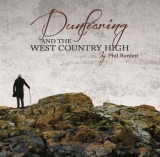 What a great start we’ve had to 2014. We’ve already reviewed some cracking albums in various genres and now we’ve got another. “Dunfearing and the West Country High” is Phil Burdett’s first album to be released on Twickenham-based Drumfire Records and it’s very, very good. If you’ve seen Phil Burdett play live, you’ll know that he has a powerful, rich baritone voice and is an accomplished acoustic guitar player. He learned to play at the age of six, was in a pre-Depeche Mode band with Martin Gore and has pursued a winding and sometimes messy path through the music scene in the south-east of England ever since.
What a great start we’ve had to 2014. We’ve already reviewed some cracking albums in various genres and now we’ve got another. “Dunfearing and the West Country High” is Phil Burdett’s first album to be released on Twickenham-based Drumfire Records and it’s very, very good. If you’ve seen Phil Burdett play live, you’ll know that he has a powerful, rich baritone voice and is an accomplished acoustic guitar player. He learned to play at the age of six, was in a pre-Depeche Mode band with Martin Gore and has pursued a winding and sometimes messy path through the music scene in the south-east of England ever since.
It’s obvious from the first listen that Phil isn’t just a songwriter; he’s a true poet. You can find any number of musical influences listed in previous reviews but you should probably add James Joyce and Dylan Thomas to that list. A quick word of advice here, don’t download this album, buy the CD; the packaging, designed by Fish Inton, is gorgeous and contains a booklet full of evocative photos and all of the lyrics.
It’s usually a pretty easy job to explain the subject of a song, but it can be a real challenge on “Dunfearing…” as Phil slips sinuously between the mundane and mystical. Even a song as seemingly grounded as “Small Talk at Sullivan’s Diner” descends quickly from the simple narrative to a deeper and darker examination of tortured souls struggling to cope with real life. The songs with a clear narrative thread are inspired by the history of Cornwall and the West Country, “Gothic Miner” and “Fate of Pirates”, for example, while “New York City Call” and “Columbus and Hope” emphasise the area’s historical links with the New World. There’s a batch of songs (“First and Last”, “Song of the Lamp”, “See the Sunset Slow and Beckon True”, “Rimbaud’s Ghost, Chapel Street & Union” and “Winter Halls”) which take inspiration from Phil’s recent Cornish sojourn, and the fatalistic “It’s Where ye Have to Go”.
Which leaves the album’s closing song, “Night Horses of the Wireless Road” to take all of these strands and pull them into an epic, mythical, stream of unconsciousness. The entire album is lyrically dense (both in volume and meanings) and the final song typifies this with references to art, music and fables, before moving abruptly into harsh reality with the news of the death of Jackie Leven, to whose memory the album is dedicated. Musically, “Night Horses…”, has echoes of Neil Young with Crazy Horse at their most laid back or maybe even John Martyn at his best. It has the same unsettling, alienating effect as The Afghan Whigs’ 1996 album, “Black Love”, particularly the closer, “Faded”.
I’m not saying this is an easy listen, but it’s worth putting in the effort. You might even have to do a bit of research on phrases like “mise-en-abyme” (you can look it up for yourself) and some of the more obscure references. Phil’s rough-hewn baritone voice and acoustic guitar (with a hint of Johnny Cash at times) are sympathetically supported by John Bennett (guitars), Steve Stott (mandolin/fiddle), Russ Strothard (bass guitar), Jack Corder (drums), Dee Hepburn (piano), Colleen McCarthy (backing vocals), Wag Porter (fiddle) and Mark Elliott (percussion) throughout the album; the playing isn’t particularly showy, but it creates a perfect backdrop for the modern folk and slight country leanings of the songs.
If you want a particularly geeky fact to impress your friends with, there are nearly thirty drinking references in the album’s lyrics, including pub names, drink names and general drinking terms, including one reference to rehab; you can take what you like from that, but I’m guessing that Phil enjoys a beer. This is an album which visits some very dark places, but closes with a heartfelt farewell to a fellow troubadour as part one of the proposed “Secular Mystic Trilogy” closes.
Out Monday March 3rd on Drumfire Records (DRMFR016).
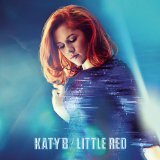 There are at least two things that the South London-raised trio of Adele, Jessie Ware and Katy B have in common. Apart from all having spent their formative years absorbing the culture that is inherent to Brixton and it subsequently informing and influencing their musical sensibilities, all three are notoriously fame-wary. Being somewhat at odds of the point and concept of what a Pop Star actually is and entails, these young women seem endearingly reluctant to outgrow their initial fanbases consisting predominantly of friends and family. This also confirms their main motive for making music – their compulsive and overwhelming love of melody and rhythm and of making connections.
There are at least two things that the South London-raised trio of Adele, Jessie Ware and Katy B have in common. Apart from all having spent their formative years absorbing the culture that is inherent to Brixton and it subsequently informing and influencing their musical sensibilities, all three are notoriously fame-wary. Being somewhat at odds of the point and concept of what a Pop Star actually is and entails, these young women seem endearingly reluctant to outgrow their initial fanbases consisting predominantly of friends and family. This also confirms their main motive for making music – their compulsive and overwhelming love of melody and rhythm and of making connections.
Adele now performs in gigantic stadiums and at the Grammys but there are constant hints that she will become a recluse sooner rather than later. Jessie Ware has found an audience with the new generation of (pop up) wine bar sophisticates and vogueing American, gay men. Katy B meanwhile has received her education and is selling her records to, amongst others, London’s funky house and UK garage club community. Out of her contemporaries Katy Brien is the one that most represents youth culture and associated underground dance music trends expertly. She may have been warned by her management to avoid going to small, local clubs, to help build the fame surrounding her, but don’t they understand that it’s intrinsic to her craft?
“On A Mission”, Katy B’s debut from 2011, established her authenticity. She wasn’t just being produced by dance artists, she was actually part of the scene itself and creating music that would be played in the clubs that she would she visit. The difference between that record and this one is actually subtle, a case of splitting hairs in many ways, but certainly significant. Then first three tracks on “Little Red” are evidence that the musical influence and direction this time around is equally American- influenced as it is British, something that was not heard on “On a Mission” whose roots never strayed too far from South London. “Next Thing”, the album’s terrific opener hurls itself at you with its retrobeat progression and, in particular, the staggered and broken synth-hook paying a massive homage to Inner City’s “Good Life” and the house music that prevailed at the time.
“5AM” continues in much the same vein and is the stronger song of the two, incorporating a quite delicious decline in the chorus’s chord progression which ends with the word ‘Valium’ and is akin to the drop in anxiety and energy that taking this drug can induce. “Aaliyah” sees follow Brixtonite Jessie Ware trading verses with Brien in what is a sly tribute to both the late R’n’B singer’s fluid and sensual phrasing and Dolly Parton’s pyscho-drama classic “Jolene”. It’s beautifully effective, appropriately seductive and bewitchingly sisterly, it’s also stands alone as a brilliant dance track.
These first three songs form a sort of loose narrative that begins with an introduction to the club and its characters, subsequently getting lost in the crowds and finally, addressing late night/early morning sexual tension and competitiveness. The fourth track, and “Little Red” is an album whose first half is unflinchingly strong, is a very big pop ballad indeed – the comedown perhaps. It is blocked out with banks of mood synths, significant key changes and a vocal performance from Brien that is as impressive as it’s believable. And that’s when that big difference of her debut versus “Red” really makes itself known. There wasn’t anything on the well-received and competent “On a Mission” that comes close to “Crying for no Reason” for pop sensibility or come to that matter, the three tracks that precede it.
There are more highlights further in with the sinewy, twisting “Tumbling Down”, and the mood house of “Everything” is reminiscent of early 90’s house group Electribe 101. “Play” is a lovely, bright Motown-influenced beat track featuring Sampha and “Sapphire Blue” is a gorgeous mid-tempo track that expertly delights with repetitive phrases and wonderment. On the very tail end of decent enough ballad “Emotions”, Katy B’s old drum and bass inflections burst forward for the manic finale and it’s only on the last track “Still”, which is a ballad too far, when the lifeless arrangement starts to sound derivative and dull.
It goes without saying that “Little Red” is available in a ‘deluxe’ format which offers up a very generous additional five songs, all new. All five are very strong indeed. Replacing the (very) few weaker tracks on the main version’s release with the likes of the warped and wonderful “Wicked Love”, for example, would have resulted in turning an album that is very good into one that’s exceptional. The additional tracks stand apart from the album proper however in that they are all archetypal UK garage and twostep including an M J Cole produced cup-up vocal track harking back to the genre’s heyday around the turn of the decade. If you want the definitive version of “Little Red” then buy the deluxe; Katy B has made a brilliant record, why would you not want to hear it all?
Out now.
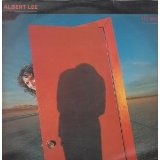 In the days following the sad and untimely death of Phil Everly, one of the musicians who was regularly interviewed was guitarist Albert Lee. I’m willing to bet that most people watching and listening had never heard of Albert Lee, despite his long relationship the Everly Brothers. The fact that he had decided early in his career to play a style of music, country, that has rarely, if ever, been fashionable in the UK meant that he had to move to the USA before achieving real recognition, joining the Crickets in 1974, then replacing the legendary James Burton in Emmylou Harris’s Hot Band in 1976. Anyway, for a few days in early January 2014, all of the old Everly Brothers songs were played across the media. I’m always happy to hear old classics reach a new audience, but the contrarian in me wanted to hear Albert Lee again, so I dug out my old vinyl copy of his second solo album, “Hiding”.
In the days following the sad and untimely death of Phil Everly, one of the musicians who was regularly interviewed was guitarist Albert Lee. I’m willing to bet that most people watching and listening had never heard of Albert Lee, despite his long relationship the Everly Brothers. The fact that he had decided early in his career to play a style of music, country, that has rarely, if ever, been fashionable in the UK meant that he had to move to the USA before achieving real recognition, joining the Crickets in 1974, then replacing the legendary James Burton in Emmylou Harris’s Hot Band in 1976. Anyway, for a few days in early January 2014, all of the old Everly Brothers songs were played across the media. I’m always happy to hear old classics reach a new audience, but the contrarian in me wanted to hear Albert Lee again, so I dug out my old vinyl copy of his second solo album, “Hiding”.
Somehow, in 1979, a single from this album managed to grab a bit of airplay, probably as a result of a particularly persistent plugger, or perhaps it was just a bit of a novelty. “Country Boy”, which opened the album, wasn’t ever going to win an Ivor Novello; it was a lyrical throwaway which showcased Albert Lee’s stunning guitar virtuosity. Throwaway or not, it grabbed my attention immediately and I scuttled off to BG Forbes to buy a copy of the album. Then back to the flat as quickly as possible to introduce vinyl to stylus while avidly reading all of the credits and sleeve notes (even an insert in this case) while listening to the album. I’ve bought many albums on the strength of one song, and I’ve been disappointed almost as many times; nothing else on “Hiding” sounded like “Country Boy” but that didn’t matter because they were all great songs.
Looking at the playing and writing credits, there were a few surprises, even with my limited knowledge of the country scene at that time. Names like Emmylou Harris and Don Everly stood out even then, but looking back with a historical perspective and greater knowledge, Buddy Emmons, Glen D Hardin, Ricky Scaggs, Rodney Crowell, Hank DeVito and Buddy Emmons were highly-respected country players at that time. More of a surprise was the inclusion of songs and performances by Chas Hodges and Dave Peacock who, after nearly twenty years as backing musicians, were now carving out a career performing cockney novelty songs. Actually I wasn’t surprised; I was gobsmacked, particularly after hearing the album’s second song, “Billy Tyler”, a Hodges/Peacock country original. I loved the song from the first time I heard it and I still love it now. I know Dean Owens will probably disagree with me here, but I think it’s the best song they ever wrote. And those are only the first two songs on the album.
“Are you Wasting my Time” is a tasteful cover of the Louvin Brothers classic with Albert Lee taking lead vocal and harmonies alongside Ricky Scaggs. “Now and Then It’s Gonna Rain”, with backing from Chas and Dave, is a country/rock song which hints at earlier Eagles material and side one closes with the beautiful Rodney Crowell ballad “On a Real Good Night”.
The side two opener is “Setting me Up”, a riff-based country/rock song written by the relatively unknown (in 1979) Mark Knopfler which is followed by another Rodney Crowell song “Ain’t Living Long like This”, a shuffle with a hint of the Buster Brown classic, “Fannie Mae”. The album’s title song is another ballad, written by Steven Rhymer (what a great name for a songwriter) and featuring backing vocals from Don Everly. The album closes out with the slow rocker, “Hotel Love”, and “Come up and See Me Any Time”, another Chas and Dave song featuring the dynamic duo themselves on piano and bass.
The album’s a classic because Albert Lee does all the things he does best; he plays guitar, sings lead and harmony vocals and chooses some tremendous songs and players to help him display these talents. There’s only one writing credit for him on “Hiding” but his interpretations of songs by other writers are arranged and played to perfection. You can hear suggestions of other artists including Iain Matthews (another wonderful interpreter of songs) and Eric Clapton but the overall sound is pure Albert Lee. I guess it’s not difficult to see why it wasn’t a hit in the UK in 1979 as post-punk took over from punk, but it has aged very well over the thirty-five years since its release. Even if you don’t normally follow links these articles, have a look at the live performance of “Country Boy” with Vince Gill. It’s not just about the great playing; the audience love it and you can see that the band loves it too. Give it a listen.
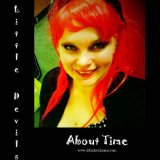 Of the original 2010 line-up of Little Devils, singer Yoka (who also plays some very nice sax and flute) and bass player Graeme Wheatley are still with the band, joined by later recruits Big Ray (guitar) and Sara Leigh Shaw (drums and backing vocals) to complete the 2014 version. “About Time” is a seven-track EP showcasing the band’s current material and, partly, creating a comparison with their earlier work. All of the playing is high quality throughout, but it’s Yoka’s superb voice which really sells the songs, from the uptempo belter, “The Waiter”, which appears here in two versions, the older version with harmonica and the newer version with sax, to the slow, powerful ballad, “Another Pack of Lies”.
Of the original 2010 line-up of Little Devils, singer Yoka (who also plays some very nice sax and flute) and bass player Graeme Wheatley are still with the band, joined by later recruits Big Ray (guitar) and Sara Leigh Shaw (drums and backing vocals) to complete the 2014 version. “About Time” is a seven-track EP showcasing the band’s current material and, partly, creating a comparison with their earlier work. All of the playing is high quality throughout, but it’s Yoka’s superb voice which really sells the songs, from the uptempo belter, “The Waiter”, which appears here in two versions, the older version with harmonica and the newer version with sax, to the slow, powerful ballad, “Another Pack of Lies”.
Two tracks in, listening to “Good Times” (which evokes Springsteen’s “Spirit in the Night”), you could be forgiven for thinking that this EP would be full of fast blues/rock party songs with powerful vocals but the third track, “Hang my Head” disproves that theory both musically and lyrically. It’s a slow/mid-tempo relationship song with clean guitar arpeggios, a nice sax solo, and a lead vocal which proves that Yoka is much more than a blues shouter. “No Love Lost” is mid-tempo and funky with a flute solo to add a slightly different texture.
“Walking Disaster” brought back memories of Marianne Faithfull’s “Why’d Ya Do It?” from her classic album “Broken English”. It covers the same lyrical territory, but Yoka’s vocal on this track also captures the same cracked intensity as Faithfull’s vocal. “Another Pack of Lies” is a standout track, a slow song which builds from a quiet intro to a big finish with perfect vocal harmonies. The song’s theme is social injustice and exploitation viewed from various perspectives and it works perfectly as a contrast to songs like “Good Times”. The EP finishes with the earlier version of “The Waiter” and I’m not sure if it’s a valuable addition or not; decide for yourself.
I’m pretty sure that the “About Time” EP (with its very clever retro seven-inch packaging) is intended as a showcase for Little Devils; if that’s the aim, then it’s a success. The songs here cover a broad spectrum from slow-tempo social comment to uptempo fun and the addition of Yoka’s saxophone and flute creates new textures and possibilities for the band. This is a thoroughly accomplished piece of work from a studio band but, on the strength of this, I can’t wait to see them live.
Released February 20, 2014.
 Serbian singer Yoya Wolf (Jovana Vujnovic) was one of the artists who contributed to the Radio (in my) Head tribute/covers album in 2013 with a grungy cover of “Wolf at the Door” and it’s obvious from her interpretation that she’s a very gifted singer with a wide dynamic range. The musicians accompanying Yoya on this single are: Miladin Stojkovic (Bass/double bass); Mladen Pecovic (guitars); Goran German (keyboards); Marko J. Kon and Ivan Bamby Mirkovic drum programming) and Dajana Ivin (backing vocals). “Open your Heart” is the first original release on Bandhouse Records and, as debut singles go, it’s a corker.
Serbian singer Yoya Wolf (Jovana Vujnovic) was one of the artists who contributed to the Radio (in my) Head tribute/covers album in 2013 with a grungy cover of “Wolf at the Door” and it’s obvious from her interpretation that she’s a very gifted singer with a wide dynamic range. The musicians accompanying Yoya on this single are: Miladin Stojkovic (Bass/double bass); Mladen Pecovic (guitars); Goran German (keyboards); Marko J. Kon and Ivan Bamby Mirkovic drum programming) and Dajana Ivin (backing vocals). “Open your Heart” is the first original release on Bandhouse Records and, as debut singles go, it’s a corker.
The song opens with some echoing piano chords sketching out a trip-hop feel followed by Yoya Wolf’s breathy, delicate vocal and a bass riff resembling Melle Mel’s “White Lines” and pauses for a beat before slamming into a “wall of sound” chorus with bass guitar and keyboards cranked up to eleven (at least). The use of this dynamic pattern is repeated through the song with quiet sections (verses or breakdowns) leading into huge choruses before fading out on the sound of a heartbeat. The playing is superb throughout and the constantly changing settings of the verse and breakdown are always resolved in the power of the chorus. This is a twenty-first century love song (hence the Valentine’s Day release) but lyrically, you won’t find any mooning and juning here because this is dark and maybe a bit obsessive; it’s a proper song for grown-ups.
“Open your Heart” is a very good song and the playing is spot-on but the crucial element is Yoya Wolf’s voice; she covers a huge dynamic range and nothing ever sounds forced. After hearing a couple of her songs, I really want to hear more; we’ll keep you posted on how you can hear more as well.
Just before publication of this review, we had the opportunity to ask her about the difference between recording covers and her own material. Here’s what she had to say:
“When you’re doing covers, you are trying to blend into style and personality of the song you’re covering as well as the artist. That way you experiment with various types and genres, which gives you wide array of possibilities. When singing your own song, you use on subconscious level all that knowledge, but you don’t consciously think about it; you let the words, music and feelings guide you. Singing from the heart is what gives you that special something.”
“Open your Heart” is now available to download here.
 229, The Venue? It’s easy to get to because it’s part of the International Students’ House complex just across the street from Great Portland Street tube station. Venue 2 is a basement room with a stage at one end and a bar on one side. The acoustics are reasonable so it’s not a bad place to watch up-and-coming bands. My mission tonight, if I choose to accept it, is to have a look at London alt-indie (let’s leave the description at that for the moment) band, Vera Lynch. In keeping with their highly eclectic sound, the band has a multinational line-up with members from the UK, USA, Hungary and the Far East. They are: Sándor Sztankovics (drums), Ted Barker (bass), Keisuke Nishikawa (guitar), Brian Pistolesi (guitar) and Guy Harries (vocals).
229, The Venue? It’s easy to get to because it’s part of the International Students’ House complex just across the street from Great Portland Street tube station. Venue 2 is a basement room with a stage at one end and a bar on one side. The acoustics are reasonable so it’s not a bad place to watch up-and-coming bands. My mission tonight, if I choose to accept it, is to have a look at London alt-indie (let’s leave the description at that for the moment) band, Vera Lynch. In keeping with their highly eclectic sound, the band has a multinational line-up with members from the UK, USA, Hungary and the Far East. They are: Sándor Sztankovics (drums), Ted Barker (bass), Keisuke Nishikawa (guitar), Brian Pistolesi (guitar) and Guy Harries (vocals).
If you could splice the musical DNA of Dick Dale, Ennio Morricone and English ‘80s post-punk, you might come close to defining the Vera Lynch sound; you might even want to throw a bit of early Bowie and INXS in there. The band has an EP out at the moment, “Evil Cowboy Surfer Songs” (to be reviewed here soon), and you might expect to hear all four songs from the EP as part of a short live set, but it doesn’t work out that way because, well, this is Vera Lynch. In fact, only two songs from the EP, “Fire” and “”Evil Cowboy Surfer Song”, make the live set. The band opens with “Dog in the Club” and then “Lost Property”, “Horror Doctor”, “Child of Jago” and the anthemic closer, “The End of the World”, follow the two songs from the EP.
It’s quite a spectacle; the band look great and they play together as a very tight unit, moving through varying musical moods with style and panache and providing a bedrock for the lead vocals. Guy Harries is mesmeric and messianic, a twenty-first century Ian Curtis (but with a sense of rhythm) who transfixes the audience with his scary, stary-eyed delivery and a voice that might just have a hint of Freddie Mercury in there as well. Musically and visually, they are impossible to ignore and you really should make the effort to go out and see them.
If you want to see Vera Lynch live in the next few weeks, you can see them at The Dolphin in Hackney on Friday February 28 or Underbelly in Hoxton on Friday April 18.
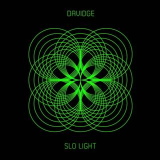 Smith & Mighty predate trip-hop by a couple of years or so, but their genre mix-up of soulful but downcast vocals and beats derived from hip-hop were a precursor to the sound that was to follow. They are still best known for their 1988 forlorn and slowly thumping cover versions of Burt Bacharach’s “Walk on By” and “Anyone Who Had a Heart”, massive club hits both of them. Neil Davidge was a core figure in trip-hop’s golden years, his most high profile work being on the second and third Massive Attack albums.
Smith & Mighty predate trip-hop by a couple of years or so, but their genre mix-up of soulful but downcast vocals and beats derived from hip-hop were a precursor to the sound that was to follow. They are still best known for their 1988 forlorn and slowly thumping cover versions of Burt Bacharach’s “Walk on By” and “Anyone Who Had a Heart”, massive club hits both of them. Neil Davidge was a core figure in trip-hop’s golden years, his most high profile work being on the second and third Massive Attack albums.
“Slo Light” is the title track from Davidge’s forthcoming album and features remote but yearning vocals by little-known New York-based Living Days singer, Stephonik Youth. The album version takes time to build from music box twinkles to threatening strings and in many ways is Davidge’s new version of “Teardrop”, the song he coaxed Elizabeth Fraser into recording for Massive Attack. Rob Smith’s remix stays close to the original version’s intentions, certainly in mood, but unsurprisingly amplifies the r’n’b elements with a persistent tom-tom drum effect to make this more of a post-club track rather than straight chill out. It’s starker than the album version and Youth’s vocals are more vivid and dominant and the push of melancholy is stronger and more immediate.
This excellent interpretation of one of Davidge’s most seductive tracks should whet your appetite for his very strong debut album, featuring Sandie Shaw and Cate Le Bon amongst others, coming early next month. I wonder if the involvement of Rob Smith indicates that Smith & Mighty may also return to the musical forum? That would be cause for a double celebration.


